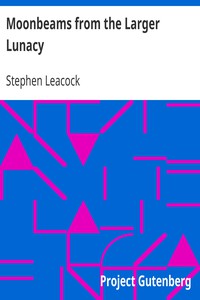Moonbeams from the Larger Lunacy, Stephen Leacock [best mobile ebook reader TXT] 📗

- Author: Stephen Leacock
Book online «Moonbeams from the Larger Lunacy, Stephen Leacock [best mobile ebook reader TXT] 📗». Author Stephen Leacock
As we have said, or did we say it, it is perhaps as a nature poet that Ram Spudd excels. Others of our modern school have carried the observation of natural objects to a high degree of very nice precision, but with Mr. Spudd the observation of nature becomes an almost scientific process. Nothing escapes him. The green of the grass he detects as in an instant. The sky is no sooner blue than he remarks it with unerring certainty. Every bird note, every bee call, is familiar to his trained ear. Perhaps we cannot do better than quote the opening lines of a singularly beautiful sample of Ram Spudd’s genius which seems to us the last word in nature poetry. It is called, with characteristic daintiness—
SPRING THAW IN THE AHUNTSIC WOODS, NEAR PASPEBIAC, PASSAMOQUODDY COUNTY(We would like to say that, to our ears at least, there is a music in this title like the sound of falling water, or of chopped ice. But we must not interrupt ourselves. We now begin. Listen.)
The thermometer is standing this morning at thirty- three decimal one. As a consequence it is freezing in the shade, but it is thawing in the sun. There is a certain amount of snow on the ground, but of course not too much. The air is what you would call humid, but not disagreeable to the touch. Where I am standing I find myself practically surrounded by trees, It is simply astonishing the number of the different varieties one sees. I’ve grown so wise I can tell each different tree by seeing it glisten, But if that test fails I simply put my ear to the tree and listen, And, well, I suppose it is only a silly fancy of mine perhaps, But do you know I’m getting to tell different trees by the sound of their saps. After I have noticed all the trees, and named those I know in words, I stand quite still and look all round to see if there are any birds, And yesterday, close where I was standing, sitting in some brush on the snow, I saw what I was practically absolutely certain was an early crow. I sneaked up ever so close and was nearly beside it, when say! It turned and took one look at me, and flew away.But we should not wish our readers to think that Ram Spudd is always and only the contemplative poet of the softer aspects of nature. Oh, by no means. There are times when waves of passion sweep over him in such prodigious volume as to roll him to and fro like a pebble in the surf. Gusts of emotion blow over him with such violence as to hurl him pro and con with inconceivable fury. In such moods, if it were not for the relief offered by writing verse we really do not know what would happen to him. His verse written under the impulse of such emotions marks him as one of the greatest masters of passion, wild and yet restrained, objectionable and yet printable, that have appeared on this side of the Atlantic. We append herewith a portion, or half portion, of his little gem entitled
YOU You! With your warm, full, rich, red, ripe lips, And your beautifully manicured finger-tips! You! With your heaving, panting, rapidly expanding and contracting chest, Lying against my perfectly ordinary shirt-front and dinner-jacket vest. It is too much Your touch As such. It and Your hand, Can you not understand? Last night an ostrich feather from your fragrant hair Unnoticed fell. I guard it Well. Yestere’en From your tiara I have slid, Unseen, A single diamond, And I keep it Hid. Last night you left inside the vestibule upon the sill A quarter dollar, And I have it Still.But even those who know Ram Spudd as the poet of nature or of passion still only know a part of his genius. Some of his highest flights rise from an entirely different inspiration, and deal with the public affairs of the nation. They are in every sense comparable to the best work of the poets laureate of England dealing with similar themes. As soon as we had seen Ram Spudd’s work of this kind, we cried, that is we said to our stenographer, “What a pity that in this republic we have no laureateship. Here is a man who might truly fill it.” Of the poem of this kind we should wish to quote, if our limits of space did not prevent it, Mr. Spudd’s exquisite
ODE ON THE REDUCTION OF THE UNITED STATES TARIFF It is a matter of the very gravest concern to at least nine-tenths of the business interests in the United States, Whether an all-round reduction of the present tariff either on an ad valorem or a specific basis Could be effected without a serious disturbance of the general industrial situation of the country.But, no, we must not quote any more. No we really mustn’t. Yet we cannot refrain from inserting a reference to the latest of these laureate poems of Ram Spudd. It appears to us to be a matchless specimen of its class, and to settle once and for all the vexed question (though we ourselves never vexed it) of whether true poetry can deal with national occasions as they arise. It is entitled:
THE BANKER’S EUTHANASIA: OR, THE FEDERAL RESERVE CURRENCY ACT OF 1914,and, though we do not propose to reproduce it here, our distinct feeling is that it will take its rank beside Mr. Spudd’s Elegy on the Interstate Commerce Act, and his Thoughts on the Proposal of a Uniform Pure Food Law.
But our space does not allow us to present Ram Spudd in what is after all his greatest aspect, that of a profound psychologist, a questioner of the very meaning of life itself. His poem Death and Gloom, from which we must refrain from quoting at large, contains such striking passages as the following:
Why do I breathe, or do I? What am I for, and whither do I go? What skills it if I live, and if I die, What boots it?Any one knowing Ram Spudd as we do will realize that these questions, especially the last, are practically unanswerable.
V.—ARISTOCRATIC ANECDOTES OR LITTLE STORIES OF GREAT PEOPLE
I have been much struck lately by the many excellent little anecdotes of celebrated people that have appeared in recent memoirs and found their way thence into the columns of the daily press. There is something about them so deliciously pointed, their humour is so exquisite, that I think we ought to have more of them. To this end I am trying to circulate on my own account a few anecdotes which seem somehow to have been overlooked.
Here, for example, is an excellent thing which comes, if I remember rightly, from the vivacious Memoir of Lady Ranelagh de Chit Chat.
ANECDOTE OF THE DUKE OF STRATHYTHANLady Ranelagh writes:
“The Duke of Strathythan (I am writing of course of the seventeenth Duke, not of his present Grace) was, as everybody knows, famous for his hospitality. It was not perhaps




Comments (0)